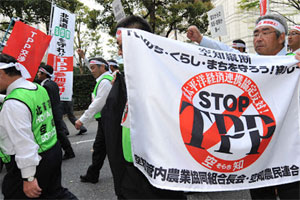The extremely controversial free trade agreement, the Trans-Pacific Partnership (between the US and 12 Pacific Rim countries), could be fast-tracked through Congress even before the details are known to its members and the public.
It’s being called "NAFTA on Steroids."
Senator Max Baucus (D-MT) and Rep. Dave Camp (R-MI) introduced fast-track legislation in both houses amidst widespread opposition from the labor and environmental communities.
Indeed, this treaty could be the final step toward corporate control. Multinational corporations would be able to “protect their future profit potential” by suing cities, counties, states or countries to wipe out existing laws – those specifically designed to protect communities’ best interests, but which get in the way of ultimate profits.
Forget environmental requirements, minimum wage, food safety regulations, the right to ban GMOs or fracking – any local ordinance could be challenged as a "barrier to trade." It could even restrict signatory nations from exercising capital controls to prevent and mitigate financial crises and promote financial stability.
Essentially, corporations would be elevated to nation-status, with the ability to sue goverments in private trade tribunals – for unlimited amounts of money – over anything that gets in the way of profits.

And if Congress votes Yes on the Fast-Track bill, the Bipartisan Congressional Trade Priorities Act of 2014, it’s voting to tie its hands on all trade deals, including the US-EU pact. If passed, future trade deals could be signed by the President and simply sent to Congress for an up-or-down vote, required within 90 days. No amendments would be allowed and even debate would be limited.
The Trans-Pacific Partnership is the biggest global trade pact since the creation of the World Trade Organization and amazingly, the details are mostly a mystery because negotiations are being conducted in secret by country Trade Reps and 600 "corporate advisors." That alone should be enough to make you extremely wary.
For example, the TPP would require countries to accept imported food that meets only the lowest safety standards of the collective participants. That means people could soon be eating imported seafood, beef or chicken products that don’t meet even basic U.S. food safety standards. And the FDA would be powerless to shut down imports of these unsafe food or food ingredients, point out Zack Kaldveer and Katherine Paul from the Organic Consumers Association.
In another example, it would require the US to export natural gas, which means much more fracking across the nation.
The city of Madison, Wisconsin unanimously passed a resolution that declares it a “TPP-Free Zone,” promising "not to obey it" if Congress passes it. It begins: "Whereas, the TPP is being negotiated by the US Trade Representative in secret without any consultation …."
Under negotiation for three years, not a single detail has been released to the public and may not be revealed until after the President signs it.
"2014 marks the 20th anniversary of NAFTA, which was only the first in a series of trade agreements that have undermined millions of middle-class American jobs and weakened our democratic structures. So it is ironic that this year supporters of that failed model are bringing forward a fast track trade promotion bill to bring us more of the same: more trade deals that strengthen corporate power and CEO profits, while putting downward pressure on wages and opportunities for the rest of us; more outsourced and offshored jobs and more attacks on domestic health and safety regulations," says Richard Trumka, President of the AFL-CIO. Labor "opposes this legislation in the strongest of terms and will actively work to block its passage," he adds.
President Clinton signed over 130 trade agreements without fast- tracking it through Congress, so the motivation is clear: multinational corporations want to push it through before too many people discover what they are buying into.
The results of NAFTA and other trade agreements are clear: they benefit only multinationals, which move jobs and factories out of the US to save on labor and environmental protection costs. Besides causing "American wages to drop and inequality to rise to terrible levels, they have led to incredible, humongous, enormous trade deficits, draining more than $540 billion of "demand" from our economy in 2012," bemoans Dave Johnson, from the Campaign for America’s Future. "This is the core reason unemployment is high and the economy is having such trouble recovering," he says.
"Trade pacts must include binding protections to consumers, workers’ rights, the environment, the climate, and much more, and Congress must be able to make sure these boxes are checked," says Michael Brune, who heads the Sierra Club. "This legislation strips Congress of its defining democratic characteristic – its check-and-balance structure."
The treaty currently includes the US, Canada, Japan, Australia, New Zealand, Mexico, Chile, Peru, Brunei, Singapore and Vietnam, but eventually every Pacific Rim nation could be included.
Read the Sierra Club report, "Raw Deal: How the Trans-Pacific Partnership Could Threaten Our Climate."
Tell your representative to vote NO on Fast Track:

 Loading...
Loading...
Thank you for this excellent overview. I’ll pass it on.
“”communities’ best interests””
For decades now, US cities and towns have adopted a “not in my backyard” attitude to all business.
My home town has been dying a slow death for the last 30 years … even though the population drops every single year – even though we are the second poorest county in the state – they have denied every single permit for new business …